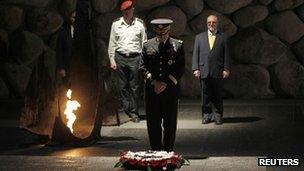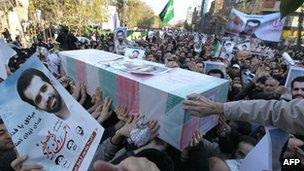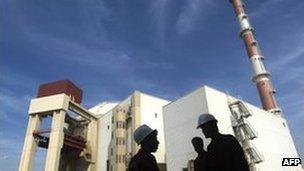Israel's fears of a nuclear Iran
- Published

US General Martin Dempsey is the latest dignitary to visit the Yad Vashem Holocaust memorial
On a cold morning in Jerusalem, US General Martin Dempsey enters the main hall of Yad Vashem, Israel's Holocaust Memorial. As he steps through the door, he removes his military cap as a sign of respect and replaces it with a Jewish skullcap.
A minute later, he is told that he can wear his own cap - and he makes a discreet swap of his headgear. The Chairman of the US Joint Chiefs of Staff then lays a wreath in remembrance of the six million Jews killed in the Holocaust.
It is a familiar ritual. Each official visitor to Israel is taken to Yad Vashem. The visit is meant to convey Israel's central message: the Jewish people were once nearly destroyed - the state must protect against similar threats in the future.
Some in Israel believe that this threat now comes from Iran - a subject that the Israeli government was keen to discuss with General Dempsey.
"I believe that Iran has its own ambition to revive the Persian Empire and they would like to do it by taking control of all of the Middle East," says Israel's Deputy Prime Minister Silvan Shalom during an interview at his offices in Tel Aviv. "They believe that a nuclear bomb is the only way for them to become an empire or to become a superpower."
On the walls of his office there is a large picture of Mr Shalom standing between two former US presidents, Bill Clinton and George W Bush. Israel is proud of its long-term alliance with the United States. But the two countries have noticeable differences over how to interpret the scale of Iran's nuclear activities.
Red lines

Many Iranians suspect Israel of being behind the killing of nuclear scientist Mostafa Ahmadi-Roshan
Some in Israel suggest that Iran is trying to build an actual nuclear bomb. But the Pentagon disagrees.
"'Are they [Iran] trying to develop a nuclear weapon ? No. But we know that they are trying to develop a nuclear capability. And that's what concerns us. And our red line to Iran is, do not develop a nuclear weapon. That's a red line for us," US defence secretary Leon Panetta told CBS News on 8 January.
Silvan Shalom sees Iran's ambitions with less subtlety. His voice rises as he speaks.
"We know what the Iranians are trying to develop and we know very well that the Iranians will do everything they can to have a nuclear bomb and I believe that we should realise that and not to argue between ourselves if they are having those intentions or not.
"It's ridiculous. They have it. What we should do is to stop them."
But how?
Israel's military chief of staff, Lt-Gen Benny Gantz, warned recently that Iran could expect "unnatural events" in 2012. His comments were soon followed by the killing of an Iranian nuclear scientist in Tehran by unidentified motorcyclists.
Iran accuses Israel of leading a covert offensive against Iran's nuclear programme. Israel's leaders remain silent on covert activities. But, in recent months, discussion of an overt Israeli military strike against Iran has increased to such an extent that the government now feels the need to calm the speculation.
"The whole thing is very far away," the Defence Minister Ehud Barak said on 18 January.
"None of us would like to go to a military option," adds Silvan Shalom. "But of course Israel cannot live with the idea that lunatics like the Iranian regime will be the one that can take a decision if they would like to destroy the state of Israel or not."
How big a risk?
But not everyone in Israel believes that Iran poses such a serious existential threat. Martin van Creveld, a military historian, says that Israel exaggerates the dangers posed by the Persian state.
"We are very self-centred; we are taught from day one that the whole world is against us that everybody hates us for no good reason and we are the righteous victims. It's a position that Israelis love and it's very useful to us," he says.
Mr van Creveld speaks from a small office in his home outside Jerusalem. Some of the 20 books he has written sit on the top shelf next to his computer. He appears to enjoy opposing mainstream Israeli opinion.
"Iran is a dangerous country but not to us," he says, "Israel is far away. Israel has got what it takes to deter Iran if necessary."
So, what happens in the Middle East if Iran gains a nuclear capability?
"Nothing happens. Nothing happens. Nothing happens," he says.
The historian believes that a nuclear Iran would help to keep the peace in the Middle East - just as nuclear weapons kept the peace between the US and the Soviet Union during the Cold War.

Israelis differ on how big a threat the Iranian nuclear programme is to their country
"I think this is not a valid analogy," says Michael Herzog, who used to run the Israeli army's strategic planning division.
"During the Cold War you had two actors who were very careful about what they owned and there were channels of communication between them," he says.
"If Iran holds a nuclear weapon without any channels of communication with Israel, given the state of relations between Iran and Israel, I think this calls for very heightened tension and potential nuclear crisis between the parties."
The Israeli establishment believes that Iran poses a serious threat to Israel's well-being. But there is one important question to put to its deputy prime minister.
But Israel is not defenceless. It has a powerful army and an undeclared nuclear capability of its own.
Surely a country would have to be suicidal to attack Israel?
"That's always the problem that we have with nice friends like you," Silvan Shalom says.
"You think in a Western way. In the Middle East, they think differently. It doesn't match. What for you looks illogical, for others it can make sense."